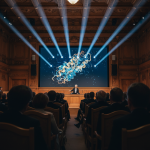Buenos Aires, mi querida ciudad, pulsates with a rhythm all its own. From the tango's passionate embrace to the bustling energy of La Boca, there's a constant dance between tradition and innovation. And as a tech culture writer, with nine beautiful years immersed in this vibrant world, I've learned that the digital realm, too, performs its own intricate choreography - a ballet of evolving technologies that asks us to step up, adapt, and lead with heart.
Today, we stand at the precipice of one such grand performance: the shift to what I call the "agentic enterprise." Forget mere automation, my friends. We are talking about a future where autonomous AI agents don't just follow instructions but anticipate, decide, and manage core workflows, acting with a level of independence that feels almost... alive. It's a breathtaking prospect, yet one that demands a strategic mindset, profound operational shifts, and above all, deeply ethical leadership. As leaders, you are not just observers; you are the maestros, guiding this new orchestra.

The Rhythmic Pulse of the Agentic Enterprise: Beyond Automation's Horizon
For so long, our digital tools have been extensions of our will - powerful, yes, but ultimately subservient. They automate tasks we define, they follow rules we hardcode. But the agentic enterprise? Ah, that's a different beat entirely. Here, AI agents are designed with specific goals and the autonomy to figure out how to achieve them, making decisions, collaborating with other agents, and learning from outcomes, all without constant human intervention.
Imagine a global supply chain where agents manage inventory, predict demand fluctuations, negotiate with suppliers, and even reroute shipments in real-time when unforeseen disruptions occur. Or a customer service ecosystem where agents proactively identify potential issues, reach out to customers with personalized solutions, and manage complex ticket resolutions end-to-end. This isn't a far-off dream; it's the horizon we're rapidly approaching.
I remember, early in my career, about six or seven years ago, working on a collaborative project across different time zones. The coordination was a daily struggle, a manual juggling act of emails, spreadsheets, and countless video calls just to keep everyone aligned. We yearned for a digital duende, a helpful spirit that could understand the project's essence, foresee bottlenecks, and just take initiative to smooth things over. We were building creative experiences, yet so much of our energy was consumed by the mechanics of execution. That longing for an intelligent, proactive partner, not just a tool, is precisely what the agentic enterprise promises. It's about elevating human potential by offloading the cognitive load of execution, allowing us to focus on true creativity, strategy, and empathy.
Crafting the Orchestra: Strategic Mindset & Operational Choreography
Embracing the agentic enterprise isn't merely a technological upgrade; it's a cultural metamorphosis. Leaders must shift their perspective from micro-management to macro-orchestration, from command-and-control to vision-and-enablement. Think of yourselves as the conductors of a grand symphony, empowering your sections (human and AI) to play their parts brilliantly while ensuring harmony and purpose.
Shifting from Oversight to Orchestration
Your role evolves. Instead of overseeing every step of a process, you'll be defining the overarching goals, designing the frameworks for agent interaction, and monitoring the high-level performance metrics. This means cultivating a deeper understanding of AI capabilities, yes, but more importantly, fostering an environment where human ingenuity and agent autonomy can flourish in concert. It's about trust, vision, and strategic foresight.
Rethinking Workflows for Autonomous Agents
This is where the operational choreography begins. Not every task is ripe for agentification. The key is to identify core workflows that are repetitive, data-rich, rule-bound, or require rapid, complex decision-making at scale. Break them down, understand their dependencies, and then redesign them with agents in mind, focusing on clear objectives, measurable outcomes, and defined interaction points for human review or intervention.
The Human-Agent Tango: Upskilling and Reskilling the Workforce
Perhaps the most crucial, and often most emotional, part of this transformation is preparing our people. The fear of job displacement is real, and it's a leader's duty to address it with honesty and empathy. This isn't about replacing humans; it's about re-tasking humans. Roles will shift from execution to supervision, from data entry to data interpretation, from routine problem-solving to complex, creative innovation that agents cannot replicate. Investment in continuous learning, in skills like prompt engineering, ethical AI oversight, and strategic thinking, becomes paramount.
- Identify Repetitive, Rule-Based Processes: Start with workflows that consume significant human time but offer limited creative value.
- Design Clear Objectives for Agents: Define success metrics and boundaries within which agents can operate autonomously.
- Establish Feedback Loops for Agent Learning: Implement systems for agents to learn from human corrections and evolving data patterns.
- Invest in Human-AI Collaboration Training: Equip your team with skills to interact with, supervise, and leverage agent capabilities effectively.
- Create Robust Governance Frameworks: Define policies for agent deployment, monitoring, and accountability.
The Soul of the Machine: Ethical Leadership and Trust in an Agentic World
As much as we are captivated by the efficiency and innovation agents promise, we must never forget the human element, the soul of our enterprises. In the rush to adopt, ethical considerations cannot be an afterthought; they must be woven into the very fabric of our agentic strategies. This demands a kind of leadership that is not just smart, but wise, not just powerful, but profoundly responsible.
Navigating the Moral Compass: Bias, Transparency, and Accountability
AI agents, like any technology, inherit the biases present in the data they are trained on. Without vigilant oversight, these biases can be amplified, leading to unfair outcomes, discrimination, and a profound erosion of trust. Leaders must champion transparency - understanding why an agent made a particular decision - and establish clear lines of accountability when things go awry. Who is responsible when an autonomous agent makes a critical error? These are not easy questions, but they are non-negotiable.
Building a Culture of Responsible Innovation
True competitive advantage in the agentic era will not just come from faster processes or lower costs, but from the integrity with which you deploy these powerful tools. It requires establishing ethical review boards, involving diverse perspectives in agent design and deployment, and continuously monitoring agent performance not just for efficiency, but for fairness and societal impact. This is where Latin American creativity truly shines - our ability to look beyond the cold logic, to infuse technology with a sense of purpose and humanity.
"The true measure of an agentic enterprise won't be in the efficiency it gains, but in the trust it builds - with its employees, its customers, and society itself. This trust is the most valuable currency in our evolving digital economy."
To illustrate the tangible impact, consider this:
| Metric | Traditional Enterprise (Current) | Agentic Enterprise (Projected 2027) |
|---|
| Operational Efficiency Gains | 5-10% (Annual) | 25-40% (Annual) |
| Time-to-Market for New Features | 6-12 Months | 1-3 Months |
| Cost Reduction in Repetitive Tasks | ~5% | ~30-50% |
| Employee Focus on Creative/Strategic Work | ~30% | ~70% |
Based on internal projections and industry analysis of early adopters (2024-2027). These figures represent potential, not guarantees, and depend heavily on careful implementation and ethical governance.
To navigate these complex waters, I suggest the following ethical framework:
- Implement Bias Detection and Mitigation Strategies: Regularly audit agent decisions and training data for unfair patterns and actively work to correct them.
- Ensure Transparency in Agent Decision-Making: Develop mechanisms to explain how and why an agent reached a particular conclusion, especially in critical areas.
- Define Clear Human Oversight and Intervention Protocols: Establish when and how humans can override or course-correct agent actions.
- Establish a Robust Data Privacy and Security Architecture: Agents will handle vast amounts of data; ensure ironclad protection and compliance.
- Foster a Culture of Ethical AI Discussion and Review: Create open forums for employees to raise concerns, share insights, and contribute to responsible AI practices.
A Symphony of Innovation and Humanity
The journey to becoming an agentic enterprise is not a sprint; it's a grand marathon, a beautiful, challenging path that promises profound rewards for those willing to embrace its complexity with courage and conscience. It's about moving beyond simply doing things faster, to doing things better and smarter, all while elevating the human spirit within your organization.
As we in Latin America often say, "El futuro no se espera, se construye." The future isn't waited for; it's built. And you, the enterprise leaders, are the architects of this next era. This transformation will demand vision, adaptability, and an unwavering commitment to ethical principles. It will redefine how work gets done, freeing your most valuable asset - your people - to innovate, create, and connect on a deeper, more meaningful level.
So, I invite you: begin your exploration with curiosity. Ask the hard questions. Foster a culture of learning and experimentation. And always, always, lead with empathy and a strong moral compass. The agentic enterprise awaits, ready for your masterful direction. What kind of future will you compose?









